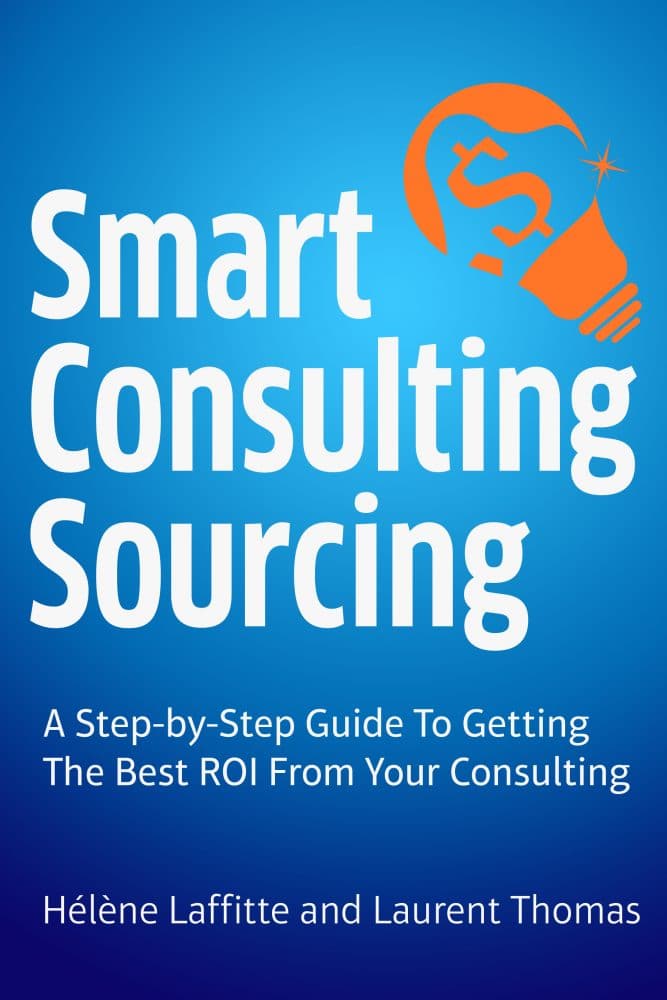
Leverage the Covid-19 crisis to decrease your consulting costs- part 2
With the pandemic crisis, consulting firms have been hit hard. The loss in revenue globally for 2020 is slightly over 10%. Most of them are now looking actively for projects and willing to negotiate on the scope and the price to get new projects.
Leverage the Covid-19 crisis to decrease your consulting costs –Act as a “risk-sharing partner.”
This means there are opportunities for client organizations to reduce their consulting costs by redefining their project and negotiating lower costs. Procurement teams will be able to hit their cost reduction targets by using the same old cost-cutting techniques.
But is it a good thing in the long term? And is it the only way to move forward?
READ ALSO
Leverage the Covid-19 crisis to decrease our consulting costs – Most consulting firms are struggling.
What will the post-Covid consulting industry look like?
Once the crisis’s peak starts fading, client organizations will start looking for support from management consultants again. They will need to decrease their costs and improve their bottom line. They will reevaluate their strategy, consider entering new markets, and adjust their innovation pipeline. They will also create new ways to engage with their employees and implement digital solutions to stay connected and reach their customers.
The consulting industry will rebound as it did after the 2008 crisis. The demand side will be there again. But what will the supply side look like
If the crisis is too long, the most vulnerable consulting firms will close down. Small, very niche boutiques will be the first victims. Companies with a larger portfolio of capabilities and industry experience will be better off.
Suppose clients play hardball during negotiations to take advantage of the crisis for too long, or they focus on large brands or one-stop shops because of risk-adversity or lack of expertise in sourcing consultants. In that case, they will accelerate the destruction of the low- and middle-market, not necessarily in their interest short or midterm.
Small and mid-sized companies will be driven out of the market or be acquired by larger firms. The supply side will consolidate, strengthen the large players’ positions, and increase their bargaining power.
Ultimately, the prices will go up, probably higher than pre-Covid. And the diversity, flexibility, and depth of expertise that small players were bringing to the table will be drowned in the big players’ talent pools. After a while, as the barrier to entry is low, most small companies will resurface in some shape or form with a different brand name when the market picks-up, but there will definitely be a lag.
The client organizations might end up on the loser’s end with higher consulting costs and less access to expert knowledge.
What can you do to take advantage of the crisis while acting as a “crisis-sharing” partner?
So how can client organizations be on the winning side in the short and long term?
As an executive, you want the consulting firm to remit their best proposition. In my experience, it comes with healthy competition, especially when the supply and demand are in your favor.
Organizing a healthy competition is not that complex. You have to keep in mind that the process’s goal goes beyond sourcing and focus on the project’s success. Organizing a competition without putting all the candidates in the right conditions to give their best answer is meaningless. You need to bring in relevant potential consulting suppliers and give them a fair chance to get the project.
This technique will work regardless of the consulting firm’s size and is a best practice that can be extended after the end of the crisis.
At this point, small and mid-sized consulting firms will be willing to exchange margin for visibility. Even during normal times, consulting firms are always looking for ways to secure their teams’ staffing. A short project will always have higher daily rates than a long one if you account for commercial and administration.
If you know you will work with them regularly for a given period, for instance, six months, you can adopt a retainer model. You estimate the minimum amount of time you will need their services and negotiate an average daily rate. You then divide this amount by the number of weeks/months in the period, and you have the retainer. Don’t forget to include the negotiated rates in the contract if the project goes over the estimated time by more than 10%.
Suppose you want to work on a given project with a consulting firm and already anticipate potential sequels. In that case, you should adopt a discount-on-volume model, which means that you negotiate the price for a standalone phase 1 and then a discount if you commit to phase 2.
The interest of these methods is that you will obtain extremely competitive pricing for your projects without putting in danger these companies. In return, you will also have some leverage to negotiate lower prices during a difficult time for your company as well.
I would recommend being extremely thorough in the reference checking. All consulting firms will be looking for new projects and stretching their portfolio of past achievements to fit your needs. A strategy consulting firm might overstate their ability to implement actionable plans. An operations consulting firm might declare deep expertise in a niche industry to increase the scope of the project. In both cases, the savings you are making on the price might not cover the decrease of impact.
Some companies apply a “business is business” philosophy anywhere and anytime. After all, companies rise and fall every day. There will always be another company providing the same service. This statement is quite true in the commodity space, but when it comes to intangible services and knowledge, such as consulting, it is just misguided.
What makes a consulting firm unique is the sum of each of its consultants’ skills and experiences. When the firm closes down or is acquired, this knowledge is scattered across other consulting firms and corporations. You may never have access to it again.
What makes consulting such a powerful lever for client organizations is the diversity of its supply market. In the long-run, your organization has more to gain to share the risks now with consultants.
Consulting sourcing tips

How to negotiate framework agreements for consulting to your advantage?
How to negotiate framework agreements for consulting to your advantage?

Make-or-buy for consulting services 101
Make-or-buy for consulting services 101

How to Hone to Perfection Your Consultant Selection with Our Top 5 List of Attributes
You are moving forward with the project and close to making a final selection of your Consulting provider. Based on the proposal assessment described in one of our previous articles, you should now have a good sense of what the Consultant can do for you, on paper.
Previous Weeks’ issues

Holiday Season Reflections: Top Themes in Consulting 2024 | This Week in Consulting
In this edition of this week in consulting, we embrace the holiday season by reflecting on 2024’s key trends like generative AI, sustainability, and social impact.

The Changing Tide of International Trade | This Week in Consulting
In this edition of This Week in Consulting, we explore how regions contribute to global trade, the challenges they face, and the opportunities to adapt amid shifting geopolitics and policies.

Digital Transformation Decoded: Challenges, Insights, and Opportunities | This Week in Consulting
In this edition of This Week in Consulting, we delve deep into the challenges and opportunities of digital transformation across industries, offering insights to strategize, adapt, and lead.
Choose the best next step for you
Buy the Book

Talk to us
Hélène Laffitte is the CEO of Consulting Quest, a Global Performance-Driven Consulting Platform and author of “Smart Consulting Sourcing”, a step by step guide to getting the best ROI from your consulting. With a blend of experience in Procurement and Consulting, Hélène is passionate about helping Companies create more value through Consulting.





